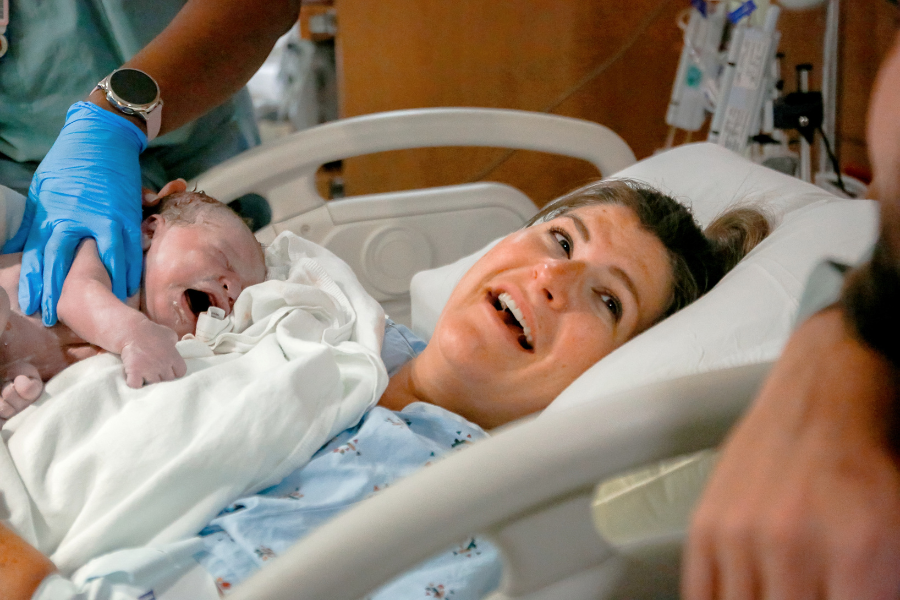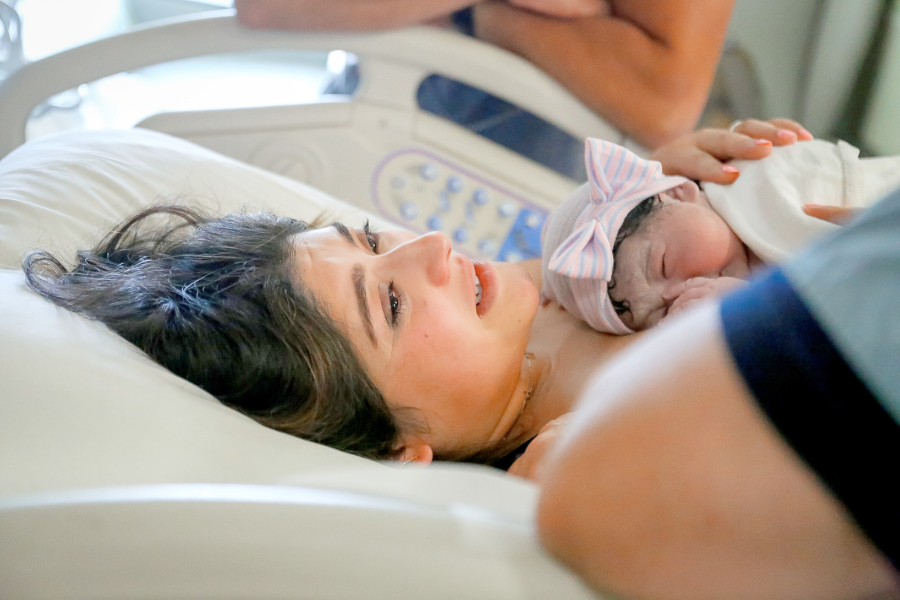Pregnancy can be a nerve racking time for a lot of mamas. And one of the most important things to get educated about right away are red flags and signs to call your doctor when pregnant.
In reality, you should call your provider whenever something doesn’t feel right, but today I want to talk about the times when you shouldn’t wait!
From stretch marks, leaky breasts, to literally growing a beard (yes, you can grow hair on your face!) it’s clear pregnancy can cause your body to do some WEIRD stuff.
However, in this article, I am going to discuss some pregnancy complications you may have that you should ALWAYS, 100% of the time bring up to your doctor.
Follow @mommy.labornurse on Instagram to join our community of over 650k for education, tips, and solidarity on all things pregnancy, birth, and postpartum!
5 Signs to Call Your Doctor when Pregnant
1. Bleeding
Vaginal bleeding is always scary during pregnancy. When you’ve gone months without a period, a drop of blood in the toilet can be quite nerve wracking.
Some women do experience bleeding in the first trimester, as baby implants to the uterine wall. This is usually described as very light spotting, many times happening even before you find out you are pregnant.
You will also have some moderate bleeding (bloody show) while you are in labor as your cervix is changing. These are the only two instances in pregnancy when bleeding is somewhat “normal”.
*Regardless of the normality, it’s important to note that ALL instances of bleeding should be brought to your midwife or OBGYN’s attention.
Causes for vaginal bleeding include:
- Problems with the placenta, including a previa or an abruption: A placenta previa is when the placenta is implanted close to or fully covering the cervix. Typically, this is not harmful for baby, unless the bleeding is excessive. A placental abruption is when the placenta detaches from the uterine wall, either partially or completely. A placental abruption is an emergency and is usually accompanied by constant, jarring abdominal pain in the location of the abruption
- Miscarriage: Miscarriage is commonly accompanied by abdominal cramping and heavy, bright red bleeding. The further along you are in your pregnancy, the more severe the cramping and heavier the bleeding will be
- Sexual intercourse: Sex during pregnancy is a very common reason for vaginal bleeding during pregnancy. The cervix is very vascular (lots of blood flows to it), and any sort of manipulation can cause it to bleed
- Abdominal trauma: External bodily trauma can cause vaginal bleeding, such as getting into a car accident or having a fall
- Ectopic pregnancy: An ectopic pregnancy is when the embryo implants outside the uterus, commonly inside one of the fallopian tubes. It is a medical emergency that is associated with severe abdominal pain and sometimes vaginal bleeding
- Preterm labor: Similarly to how your cervix can bleed a bit when you are in labor at term, preterm labor commonly causes bleeding as you have contractions and your cervix changes
- Uterine rupture: A uterine rupture is a very rare event that would most likely happen to a woman who is in labor and has had a previous C-section. However, it can happen to anyone regardless of circumstance
- Infection: Sometimes bacterial infections of the vagina, uterine infections, or sexually transmitted diseases can cause vaginal bleeding
Related Reading: What to Expect At Your Prenatal Visits
Related Reading: First Trimester Tips (from a nurse)
2. Abdominal pain
There is only one time you should have abdominal pain that is warranted during your pregnancy, and that is when you are in labor! Labor after 37 weeks to be exact. All other instances should be brought up to your provider, as abdominal pain can signal many different problems. Most of these I’ve brought up above in the bleeding section, but some common reasons include:
- Preterm labor
- Miscarriage
- Braxton-Hicks contractions
- Placental abruption
- Ectopic pregnancy
- Infections
- Uterine rupture
- Constipation
- Round ligament pain: The uterus is a muscle, and there are ligaments running alongside it on the front of your belly that stretch as your baby grows. Sometimes this stretching can be painful and cause some discomfort during pregnancy. This will happen especially as you change positions. It’s important to note, round ligament pain is not at all harmful to baby.
3. Leaking
Amniotic fluid is the cushion that helps to protect baby during your pregnancy. It’s also important for baby’s lung maturity.
It’s common to have your water break spontaneously when you are in labor, however sometimes it happens before you are term. This is what your OBGYN is concerned about if you report any vaginal leaking before week 37.
Sometimes vaginal infections can cause increased discharge during pregnancy. Also, towards the end of your pregnancy, you may have an increase in this discharge as your body is preparing for labor.
Discharge is a different consistency than amniotic fluid, however. Amniotic fluid is usually in a much greater abundance and more watery than normal vaginal discharge.
If you think your water has broken at any time in your pregnancy, regardless of your gestational age, call your provider. There are a number of tests that can be done to determine if you have or not.
This actually happened TO ME! I thought my water broke but it turned out that wasn’t the case.
And hey, if you’re headed off to the hospital because you are term and you KNOW your water broke (aka you had a HUGE gush of water from down there and it’s dripping on the floor!) make sure you don’t forget these essential items in your hospital bag!
Related Reading: What is a Midwife? Could Midwifery Care Be Right For You?
4. A decrease in movement
View this post on Instagram
Research shows that kick counting is a free and SUPER effective way for mamas to track the wellbeing of baby in the womb, spot potential problems, and prevent stillbirth!
- There is no set number of movements you need to feel – your baby will have their own pattern of movements that you should get to know
- Movements can be kicks, flutters, swishes, rolls, jabs, or anything in between (except hiccups!)
- A reduction in baby’s movements can sometimes be an important warning sign that that the baby is unwell
- If you have noticed a change in your baby’s movements (less active/weaker or a sudden frantic increase) contact your healthcare provider immediately
- Do not try to prompt your baby to move with sugary or cold drinks (call & go in!)
- It is NOT true that babies move less towards the end of pregnancy
If baby does not move ten times in two hours, call your doctor. This can be a sign that baby is in distress. Think about when you feel sick and under the weather, you don’t like to move around, and you tend to stay in bed. This is the same reasoning behind why babies move less when they are stressed.
It is important to note that babies do have sleep cycles in the womb, and when babies are sleeping they don’t move as much. Babies tend to like to sleep when you are up moving around. This is why it’s important to do fetal kick counts when you are lying down, because this is when babies like to wake up!
5. Headache or blurry vision
When you go to your scheduled appointments, your provider will always ask you if you have been having any headaches or blurry vision.
Headaches or blurry vision can be a sign of preeclampsia, a life-threatening pregnancy complication for you and baby.
Preeclampsia is more common towards the end of your pregnancy, but it may happen at any time after 20 weeks of gestation. It is characterized by:
- Elevated blood pressure
- Swelling in your extremities
- Protein in your urine (this is also the reason you must pee in a cup each time you have a prenatal appointment)
Preeclampsia is dangerous for you because if your blood pressure is extremely high, it can cause you to have a seizure or a stroke. It is also very dangerous for baby because as your blood pressure elevates, less blood flow and oxygen get to your placenta, which ultimately means less blood flow and oxygen for baby.
Now you know when to absolutely call your provider during pregnancy!
I know I’ve said this a dozen times already, but PLEASE bring up any of these concerns to your doctor. Don’t rely on little ol’ me to diagnose your pregnancy complications.
I am a nurse, but I’m not YOUR NURSE! Please see my disclaimer for more information.
With that said, here’s to a safe and healthy pregnancy! And remember, you can call for ANY reason or concern – this is certainly not an exhaustive list.
Never worry about being annoying or overbearing, we’ve heard it all and WE WANT TO HELP YOU! We’d much rather you call for a false alarm than an emergency go unreported.





